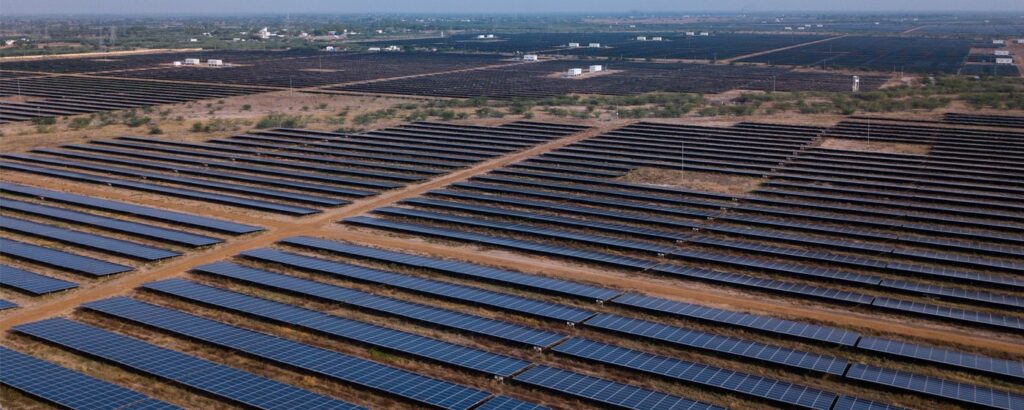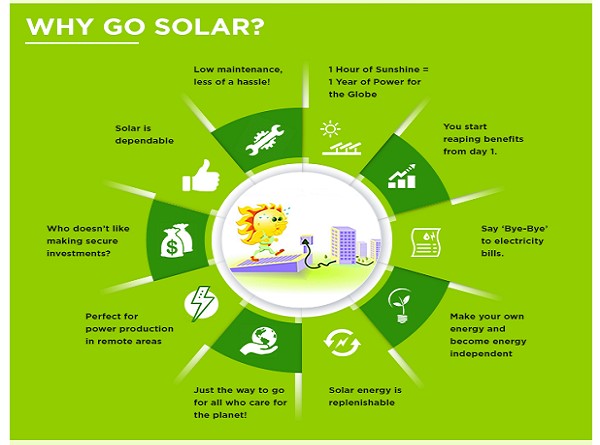The ill-effects of climate change which were overlooked a few decades back, are now becoming too evident everywhere to get ignored. Environment and Climate change have become major international issues these days. The uninhibited fossil fuel consumption which contributed most to damaging the environment has gone far too long and needs to be controlled and brought down to protect the environment from further aggravation. The world is swiftly turning to renewable energy. From electric vehicles to solar cells, there is a realization that excessive reliance on fossil fuels to power economies may not be sustainable. As a responsible nation, India is also boosting its green energy production through wind, solar and hydro projects, in addition to reducing its dependence on fossil fuels.
INTERNATIONAL SOLAR ALLIANCE: To encourage the exploitation of solar energy which is a clean energy, India took a big initiative when Prime Minister of India and French President Francois Hollande launched International Solar Alliance (ISA) on November 30, 2015, at the 21st session of United Nations Climate Change Conference of the Parties (COP21) in Paris, France. The ISA is guided by its ‘Towards 1000’ strategy which aims to mobilise USD 1,000 billion of investments in solar energy solutions by 2030, while delivering energy access to 1,000 million people using clean energy solutions and resulting in installation of 1,000 GW of solar energy capacity. The ISA aims to mobilize knowledge, technical assistance, and investments towards helping member countries achieve their developmental goals in a sustainable way through deployment of solar energy. The International Solar Alliance has membership of over 100 countries including USA who joined the alliance in November 2021. Recently India pledged to achieve net-zero emissions by the year 2070 at the Global Climate Meet in Glasgow last year. In his remarks to the COP26 climate summit in Glasgow, Prime Minister Narendra Modi said India would aim to build 500 gigawatts of renewable energy by 2030.
RENEWABLE ENERGY IN INDIA: In order to achieve its objective of promoting clean and green energy, Government of India took several policy measures and financial initiatives to ensure rapid investment in renewable energy sector. As a result, India is currently 4th largest in installed wind power and 5th largest in installed solar power in world. Overall, India is 4th largest country in terms of installed renewable energy. India’s renewable energy sector has a share of 38% in total installed generation capacity (149GW as of Oct-21) in the country. The solar energy capacity increased from 2.6 GW to more than 46 GW in past 7.5 years. As India is set to achieve the renewable energy capacity target of 175GW earlier than expected, the country has revised and set an ambitious target to achieve a capacity of 227 GW worth of renewable energy by the end of 2022, which will expand to 500 GW by 2030. This is the world’s largest expansion plan in renewable energy almost adding 33GW each year for next 9 years.

PLI SCHEME IN SOLAR ENERGY
In April 2021, the Union Cabinet approved a ₹4,500 crore production linked incentive (PLI) scheme to boost domestic manufacturing capacity of solar PV modules. The scheme aimed at adding 10,000 MW manufacturing capacity of integrated solar PV modules entailing direct investment of ₹17,200 crore at present. The scheme was successful and around 16 companies applied for setting up manufacturing facilities under the scheme. In Budget 2022, Government has made an additional allocation of Rs 19,500 crore for PLI for manufacturing of high-efficiency modules with a priority to fully integrate manufacturing units from polysilicon to solar PV modules. The PLI scheme allocation in Budget 2022 will bring an additional investment worth Rs 30,000-35,000 crore into solar Photovoltaic cells and modules manufacturing in India, cutting dependence on Chinese imports, and bringing the nation closer to achieving 2030 renewable energy targets.
NEW JOBS FOR YOUNG INDIA: The Renewable Energy (RE) sector has ample opportunities for start-ups and entrepreneurs in the country. For example, in solar energy sector the opportunities include EPC work, O&M work, cleaning of solar panels, installation of rooftops, coordination for testing of solar equipment, skill development, consultancy work and new innovative product development. Ministry of New and Renewable Energy (MNRE) and International Solar Alliance (ISA) have initiated deliberations on employment opportunities for women in Renewable Energy sector and have sought views of several international and national bodies concerned with clean energy and women welfare and employment.
Sustainability and preservation of the environment has always been central pillars of India’s rich culture and traditions. These have found reflection in the policies of Government to promote Renewable Energy in recent years. The stellar growth of the Renewable Energy sector in the past about 7 years coupled with the achievement of providing universal electricity access is a testimony to the fact that government is committed to fighting climate change and preserving the environment without compromising on rapid progress. With the kind of efforts being made by the government and entrepreneurs in India, India is confidently moving to achieve net-zero emissions by the year 2070 as pledged at the Global Climate Meet in Glasgow last year.





